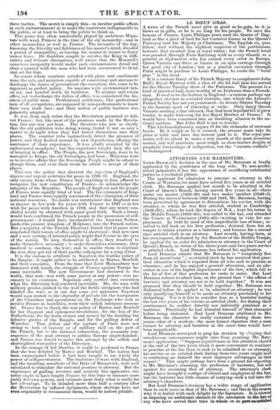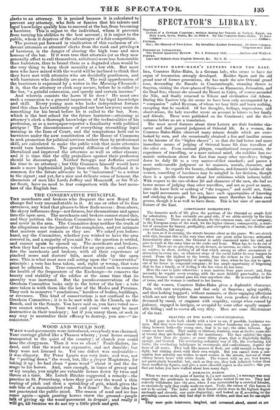ATTORNIES AND BARRISTERS.
LORD DENMAN'S decision in the case of Mr. Bateman is loudly applauded by- the gentlemen of the long robe. To non-profes- sional judgments it has the appearance of sacrificing substantial justice to a technical phrase. The applicant for admission to practise as attorney in the Courts at Westminster must have served five years as an articled clerk. Mr. Bateman applied last month to be .admitted in the Court of Queen's Bench, having served five years in all—three under one master (1826-29) and two under another (1844-.5). ,During the interval between 1829 and. 1843, Mr. Bateman, having been permitted by agreement to discontinue his service with the attorney to whom he was first articled, studied at Cambridge (1829-33); where he took the degree of B.A. ; kept his terms in the Middle Temple (1833-35); was called to the bar, and attended the Courts at Westminster (1835-43)—waiting in vain for em- ployment. In 1843 he tired of this unprofitable loss of time ; re- solved to fall back on his first profession ; desisted from his at- tempts to obtain practice as a barrister ; and became for ,a second time articled clerk to an attorney. Last month, having been, at his own request, disbarred by the Benchers of the Middle Temple, he applied for an order for admission as attorney in the Court of Queen's Bench, in virtue of his three-years and two-years service as articled clerk. Lord Denman has refused his application. Lord Denman admits that Mr. Bateman is "completely free from all moral taint " ; as articled clerk he has received that prac- tical education which is required from all who seek to practise as attornies ; and he has enjoyed a general education, and an edu- cation in one of the higher departments of the law, which fall to the lot of few of that profession he seeks to enter. But Lord Denman refuses to admit him, on the ground that "the offices of barrister and attorney are not to be held together." It was not proposed that they should be held together : .Mr. Bateman was disbarred before he applied to he admitted an attorneyS he was only qualifying himself to be made an attorney previously- to his disbarring. Nor is it fair to consider him as a barrister during the last two years of his service as articled clerk ; for during their- continuance he neither directly nor indirectly practised as a barrister. Practically he had denuded himself of that character before being disbarred. Had _Lord Denman attributed to Mr. Bateman the character he really sustained during those two years—that of a student—the mere formal objection that a man cannot be attorney and barrister at the same time would have been inapplicable. Lord Denman attempted to prop his decision by alleging that mischievous consequences might arise from granting Mr. -Bate- man's application : "Suppose a gentleman in this situation should at the end of the two years think it more convenient to continue in practice at the bar than to seek to be admitted as an attorney, his service as an articled clerk during those two years might lead to conferring en himself the most improper advantages in that respect." This might perhaps have been a ground for objecting to Mr. Bateman's resuming the profession of barrister, but not against his assuming that of attorney. The attorney's clerk might have brought a cortege of clients and employers to the bar, but the barrister has little chance of carrying such a tail into the attorney's chambers.
But Lord Denman's decision has a wider range of application than to such cases as that of Mr. Bateman ; and this is the reason why it is hailed with such delight by the barristers. It is viewed 88 imposing an additional obstacle to the admission to the bar of any who have served their time in whole or in part asiartioled ulerks to an attorney. It is praised because it is calculated to prevent any attorney, who feels or fancies that his talents and Iegal knowledge quahfy him to succeed at the bar, from becoming hrbarrister. This is unjust to the individual, whom it prevents from turning his abilities to the best account ; it is unjust to the public, whom it deprives of the advantages of a fair competition. The pretext put forward in vindication of this exclusion of ci- devant attornies or attornies' clerks from the rank and privileges ,of barrister, is the danger of abasing the high tone and nice honour of the bar. If it were true that attornies (or as they now generally affect to call themselves, solicitors) were less honourable than barristers, thus to brand them as a degraded class would be the very thing to keep their morality at a low ebb. But most men who have mixed with the world will be inclined to think that they have met with attornies who are decidedly gentlemen, and with barristers who decidedly are not. The real apprehension of the barristers is expressed by a writer in the Morning Chronick : it is, that the attorney or clerk may secure, before he is called to the bar, "a gainful connexion, and speedy and certain income."
And wherein consists the harm if he does ? He must owe such a connexion to a general impression of his legal knowledge and skill. Every young man who lacks independent fortune (and this class have uniformly supplied our best lawyers) must do something for his bread before he is called to the bar. Now, which is the best school for the future barrister—attaining as attorney's clerk a thorough knowledge of the technicalities of his profession, or as a newspaper-reporter a familiarity with political Intrigue The discontinuance of everything resembling legal training in the Inns of Court, and the temptations held out to barristers under the new constitution of the House of Commons to seek promotion for political services rather than by professional skill, are calculated to make the public wish that more attornies would turn barristers. The general diffusion of education has liberalized and improved the attornies as well as other classes; and it is time that the silly- prejudices against their profession should be discouraged. Neither Scroggs nor Jefferies served his time to an attorney; but Oily Gammon himself would have made a more highminded judge than either. In Scotland it is common for the future advocate to be "indentured" to a writer to the signet ; and yet, for a nice and delicate sense of honour, the 'characters of men like Lords Jeffrey and Moncreiff, or Sir Wal- ter Scott, have no need to fear comparison with the best mem- bers of the English bar.



























 Previous page
Previous page